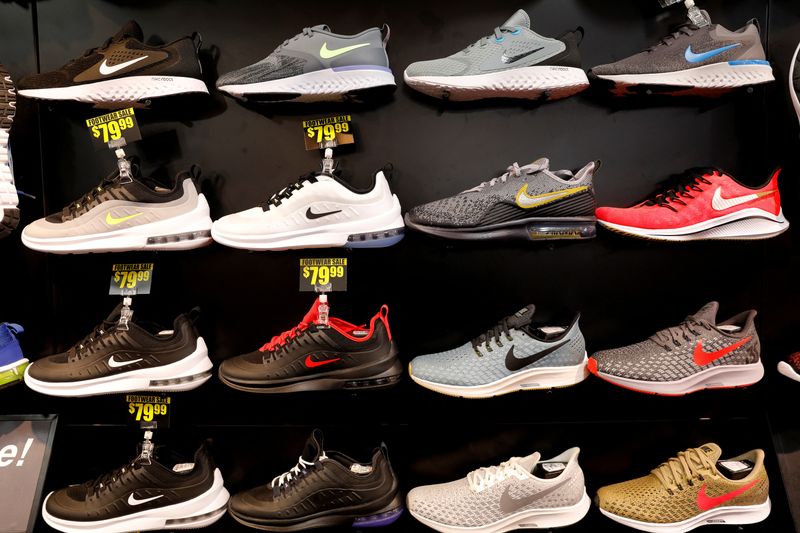By Ananya Mariam Rajesh and Nicholas P. Brown
(Reuters) - Investors and analysts expect Nike (NYSE:NKE) to lower annual forecasts on Tuesday when it posts quarterly results, the company's first earnings report since announcing a new CEO earlier this month.
Elliott Hill, who spent 32 years at the sportswear giant before retiring in 2020, will return as top boss starting Oct. 14 to succeed John Donahoe, Nike announced on Sept. 19.
Hill faces the daunting task of turning around a once-dominant brand now ceding market share and challenged of late by smaller, nimbler competitors such as Deckers' Hoka and Roger Federer-backed On.
"This is going to be one of those quarters where they're probably going to try to dump all the bad news as much as they can now and get it over with and start new," said Jay Woods, chief global strategist at investment banking firm Freedom Capital Markets.
Woods said he expects investors to give Hill a "grace period" as he comes on board but added, "The question is, can he, with his experience and deep ties seeded in the iconic Nike brand ... bring some magic back?"
Four brokerages had trimmed their stock price targets for Nike heading into the quarter, but after the company announced Hill's new role, five brokerages raised their price targets.
Nike's first-quarter revenue is expected to decline 10% to $11.65 billion, its steepest drop in more than four years, and a drop of 44.7% in earnings per share to 52 cents, according to analysts estimates compiled by LSEG.
In June, Nike forecast a surprise drop in annual sales, and some analysts expect it to further revise those targets on Tuesday.
Analysts have revised their expectations since and on average expect the company to report a 5% drop in fiscal 2025 annual revenue.
"Given the problems that they have had, I think it makes sense to kind of reset expectations lower, or remove guidance for now and give the incoming team a chance to review the business, see what they think they can fix and how long it'll take," Truist Securities analyst Joseph Civello said.
Nike's shares are up more than 10% since Hill was named CEO, recouping some losses after the stock hit its worst day ever in June.
Investors will also watch out for any boost from the Paris Olympics. Nike and Puma managed to increase visits to their direct-to-consumer sites in the opening week and convert them into a good percentage of sales, research firm Similarweb (NYSE:SMWB) said in August.
INNOVATION CONUNDRUM
Nike has had to pull forward some launches after losing ground to Hoka and On, whose trendy and more comfortable shoe lines are resonating with consumers.
"If you look at any retail brand, especially on the shoe side, it seems like the new entrants are kind of getting all the glamour here right now," said Dave Wagner, head of equities at Aptus Capital Advisors, which has a stake in Nike.
"Nike has needed to innovate more, but they are just behind the train right now."
Nike in the last two quarters has unveiled new performance and running shoes like Air Max Dn and Pegasus 41, and has announced plans to roll out a new $100-and-under sneaker line to attract cost-conscious consumers. But the moves have yet to show big results.

Meanwhile, the company has also relaunched certain shoes with only minor tweaks, such as color. That's not good enough, said Jessica Ramirez, senior analyst at Jane Hali & Associates.
"I don't think the second-half is going to be good for Nike ... until we see new products in the product line for 2025," Ramirez said.